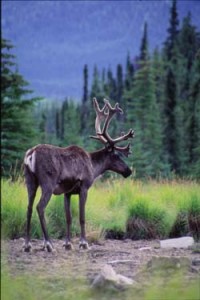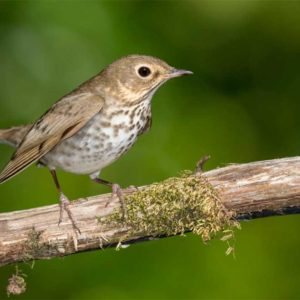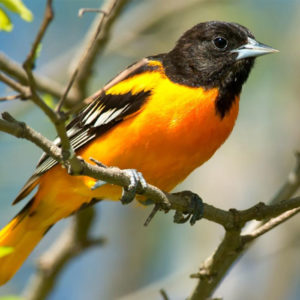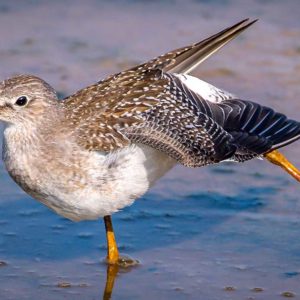Looking Back on Two Years of Hard Work

Since Nature Canada began what has now been a two-year long commitment to act as a joint intervenor with BC Nature on the Northern Gateway Pipeline review process, long hours and a lot of elbow grease has gone into participating in the hearings.
Thanks to donor support and the pro bono help of Chris Tollefson and his legal team at the University of Victoria Environmental Law Centre, we have been very busy and effective in the final stages of the Northern Gateway hearings.
We would like to share with you some of the valuable work that has been made possible through the combined efforts of all three groups.
Over the past two years, we have:
- Conducted 25 hours of cross examinations of four distinct Northern Gateway experts panels on topics ranging from caribou biology, to ornithology, to spills probability and consequence modelling
- Filed and argued four motions which have succeeded in adducing critical new evidence around caribou issues, and drawing national attention to the procedural deficiencies with the current Joint Review Panel process
- Made five trips to northern B.C. usually of 3 to 4 days duration or longer including
- 2 trips to Prince George, B.C.
- 3 trips to Prince Rupert, B.C.
- 1 trip to Terrace, B.C.
- Completed a 92 page single spaced final written argument
- Completed oral argument in reply to Enbridge two hours after Enbridge delivered theirs
- Secured media coverage of BC Nature and Nature Ccanada and interviews in The Globe and Mail, Toronto Star, Vancouver Sun and dozens of other newspapers, national and local radio and television, Canadian Lawyer and a forthcoming feature piece in American Lawyer
Well over 1,000 hours of senior lawyer time, 2,000 hours of student time as well as thousands of dollars in travel costs and other disbursements were provided pro bono by the UVic Environmental Law Centre and its funders during this process.
In a recent conversation, we asked Chris Tollefson, Executive Director of the Environmental Law Centre, to reflect on some of the ground-breaking moments in our involvement in the hearings.
Nature Canada: Enbridge has been arguing that the project poses little threat to BC’s wilderness, even as they attempt to explain spills like the one in Michigan’s Kalamazoo River. The evidence we submitted to the panel suggests otherwise. What did you argue?
Chris Tollefson: From the beginning we have argued that Enbridge has underestimated the project’s risks. First we focused on the endangered woodland caribou. Enbridge misjudges the threat of increased mortality from predators, and the impact that fragmentation of habitat will have on the caribou’s ability to feed and breed.
Nature Canada: What was so flawed about Enbridge’s science on the woodland caribou?
Chris Tollefson: Their assessments are far too rosy. For example:
• Enbridge relied on just a single source – an unpublished, non-peer-reviewed slide show on Yukon Caribou – to derive the ‘linear feature density’ number that they say justifies the project. The problem is that the number is unsupportable, and the source they rely on never actually approved of the number in the first place. Mark Hume of the Globe says that this error, uncovered in our cross-examination, “might just be enough to sink the project”.
• Enbridge used data that looked at the availability of caribou winter habitat without considering summer habitat availability. A robust analysis would have looked at both.
• We fought – successfully – to have new caribou research entered into evidence that raised urgent questions about the fate of caribou, wolves and the Gateway Pipeline.
Nature Canada: And what about Enbridge’s claims about the potential impact of oil spills?
Chris Tollefson: First of all, the company avoids looking at worst-case scenarios, such as a spill within the globally significant Scott Islands Important Bird Area. To truly understand the total risk involved of a project that would bring giant tankers into these pristine waters at the rate of one every other day, we argued that the consequences are too high to do anything but prepare for the worst.
Secondly, Enbridge has downplayed the consequences of an oil spill by arguing the “scientific literature is clear” that species inevitably recover. We forced them to concede, however, that none of the studies they cite involved marine mammals, and only one study of marine birds they cite showed post-spill ‘recovery’. Enbridge also failed to consider the potential impact of oil spills on open ocean wanderers such as albatrosses and shearwaters.
We would like to thank BC Nature and the Environmental Law Centre for their hard work, ingenuity and perseverance during the hearings.
Recommendations from the Panel to the federal government are expected later this year.
For a summary of our participation in the Northern Gateway Pipeline hearings, read our previous posts on the topic here.



